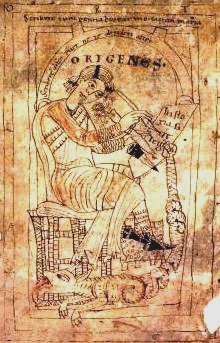Origen was born in the city of Alexandria in c. 185 to Christian parents.
He was educated by his father, Leonides of Alexandria, who gave him a standard Hellenistic education, but also had him study the Christian scriptures. Origen also reportedly studied under Clement of Alexandria and was influenced by his teachings.
In 202, Origen's father was martyred in the outbreak of the persecution during the reign of Septimius Severus. The teenager had to be restrained from following him into martyrdom by his mother hiding his clothes.
Origen left Alexandria in 231–2, and made his permanent home in Caesarea in Palestine, where his friend Theoctistus was bishop. There he founded a school of literature, philosophy and theology.
Origen was judged by many to be the most accomplished scholar of his day. He developed an allegorical interpretation of the Bible, including the idea of Christ as the Logos, or incarnate Word, who is with his Father for eternity. Controversially, he also taught that the Son is subordinate to the Father in power and dignity.
Origen's last treatise, Contra Celsum, (Against Celsus) was written about 248. A long, closely reasoned apologetic work, it refuted arguments advanced by Celsus, an influential Plato influenced philosopher from the previous century who was perhaps the first serious critic of Christianity.
Origen went to extremes in his asceticism. He was constantly fasting, refused wine and all luxury foods and slept on the bare floor.
Origen died in c. 254 after being tortured during the Decian persecution of Christians.
In his lifetime Origen toiled incessantly writing around 6,000 works in Greek, including books, letters and pamphlets. Controversially he entertained some questionable speculations such as a belief in the pre-existence of souls, who from the day of creation he claimed to have existed in a series of created worlds.
His writings are included in the general collection of early Church Fathers. However, unlike many church fathers, Origen was never canonized by the Catholic Church, as some of his teachings directly contradicted the teachings attributed to the apostles, notably the Apostles Paul and John.
He was educated by his father, Leonides of Alexandria, who gave him a standard Hellenistic education, but also had him study the Christian scriptures. Origen also reportedly studied under Clement of Alexandria and was influenced by his teachings.
In 202, Origen's father was martyred in the outbreak of the persecution during the reign of Septimius Severus. The teenager had to be restrained from following him into martyrdom by his mother hiding his clothes.
 |
| Origen |
Origen left Alexandria in 231–2, and made his permanent home in Caesarea in Palestine, where his friend Theoctistus was bishop. There he founded a school of literature, philosophy and theology.
Origen was judged by many to be the most accomplished scholar of his day. He developed an allegorical interpretation of the Bible, including the idea of Christ as the Logos, or incarnate Word, who is with his Father for eternity. Controversially, he also taught that the Son is subordinate to the Father in power and dignity.
 |
| Origen, Illustration from "Les Vrais Portraits Et Vies Des Hommes Illustres" by André Thévet |
Origen's last treatise, Contra Celsum, (Against Celsus) was written about 248. A long, closely reasoned apologetic work, it refuted arguments advanced by Celsus, an influential Plato influenced philosopher from the previous century who was perhaps the first serious critic of Christianity.
Origen went to extremes in his asceticism. He was constantly fasting, refused wine and all luxury foods and slept on the bare floor.
Origen died in c. 254 after being tortured during the Decian persecution of Christians.
His writings are included in the general collection of early Church Fathers. However, unlike many church fathers, Origen was never canonized by the Catholic Church, as some of his teachings directly contradicted the teachings attributed to the apostles, notably the Apostles Paul and John.
No comments:
Post a Comment